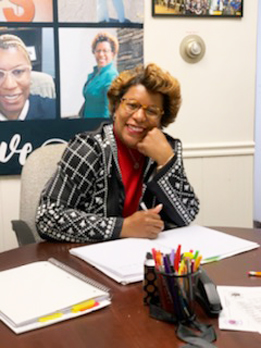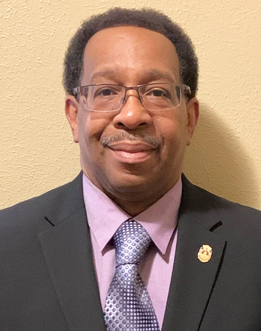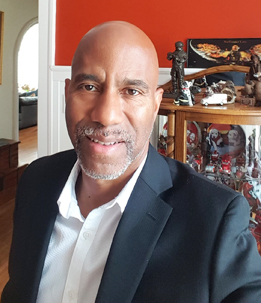
By Tricia Hall
The Truth Reporter
Local community organizations collaborated to facilitate a webinar conversation on Sunday, February 20 starting at 5:00 p.m. The virtual event was entitled, “S.A.F.E. Encounters, Sound Advice for Effective Encounter,” and featured Maurice Morris, Angel Tucker and Chris Byrd.
The webinar training was convened by: National Association of Negro Business and Professional Women’s Club (NANBPWC) of Maumee Bay, National Association of Negro Business Professional Women’s Club (NANBPWC) of Toledo, National Sorority of Phi Delta Kappa (NSPDK) the Beta Gamma Chapter, Pathway for Successful Leadership (PSL), and Top Ladies of Distinction (TLOD) Toledo Chapter.
The program opened with welcome remarks delivered by Tyra Smith, the president of NANBPWC Toledo Club and the founder and CEO of Pathway for Successful Leadership. Kanise Winfree of PSL shared the information logistics and panelist introductions and Rozanae Arrington of PSL presented the event purpose and panelist introductions, and Zonta’e Moore Jr of PSL offered a prayer.
“God bless us and protect us. Thank you for a new chapter. Thank you for another year God, keep us safe in our cars and school God.”
Maurice Morris, who is founder of MDM Empowerment Group, an organization that focuses on educating the community about public interactions with law enforcement, was the first speaker. Morris is a native of South Carolina and has resided in Toledo for over 40 years. He’s served as a police cadet with Charleston County Sherriff’s Department Explorer Post and as a former Eligibility Specialist with Lucas County Job and Family Services. He joined the Lucas County Sheriff’s Office in 1994, is a former Toledo Lucas County Public Library safety officer, was recently appointed to the Safe Cop Coordinator for Lucas County by the National Police Defense Foundation, and has served as the National Recruiter for Golden Badge.

Morris’ presentation combined positive and negative video interactions between Black people and law enforcement. The majority of the videos were between Black men and non-Black law enforcement officers, while a few featured Black women.
“I’m in this space because it’s needed for our youth and we see it across the country,” he said during his opening remarks. “This is about knowing your rights and how to react when interacting with law enforcement.”
The first two videos depicted a negative interaction between a young Black male who was arrested for walking in the street following a snow storm and a positive interaction between a Black male who received a free bicycle from an officer after walking to and from work for over four hours daily.
“I love it when law enforcement is engaged in our community,” stated Morris.
Morris’ presentation continued with two additional videos that showed a negative interaction between a Black woman who was studying in a public park and was told she had to leave because she didn’t have children and a video that highlighted how Black people wanted to be treated by law enforcement officers.
“Young people know the different between private and public property. These are some interactions that happen with law enforcement in this country and they can alter our life decisions to approach or arrest us. Officers have told me that they have walked up to citizens and asked for their identification without cause because they know that we don’t have the money or resources in the Black community to push back. We want to address this locally and nationally with Golden Badge,” explained Morris following the third video.
“Compile with an officer and complain later. You can ask for the officer’s name and badge number, so once you survive the encounter, you can file a complaint later. These complaints are investigated by Internal Affairs. Please understand that if you’re contacted by law enforcement, they can ask for your legal name and identification, but anything else you don’t have to provide.
In addition to showing additional videos, Morris concluded his presentation by providing these de-escalation tips: respect personal space, use non-threatening body language, don’t touch the officer, comply now and complain later, and you can record an incident as long as you don’t interfere with police activities.

Brian Byrd, newly appointed City of Toledo Safety Director, was the second speaker. Byrd was appointed to the Toledo Fire and Rescue Department in 1988, promoted to lieutenant in 1992, captain in 1997, battalion chief in 2000, deputy chief in 2008 and appointed chief of Toledo Fire & Rescue Department in 2018. He continued his post-high school education at Pennsylvania State University, the University of Toledo, Owens Community College and the National Fire Academy. Byrd is a member of the Salvation Army’s Advisory Board and Big Brothers Big Sisters of Northwest Ohio’s Board of Directors.
“I greatly appreciate the information that was presented by Mr. Morris,” shared Byrd during opening remarks. “I’m not a law enforcement officer but what I can speak about are the choices that our youngsters are making. We should know who our children’s acquaintances are, youth should know who their friends are. Be aware of who you’re hanging out with before you get into a car with them. Whether you’re innocent or not, you could be guilty by association. I’m not saying that you shouldn’t have friends but be aware of their behavior.”
Angel Tucker, newly appointed City of Toledo Assistant Safety Director, was the third speaker. Tucker was the first African-American police officer in the City of Oregon Police Division, worked to increase recruitment of more diverse candidates for first responders, was instrumental in facilitating a code of conduct agreement between Farm Labor Organizing Committee and the City of Oregon, and brokered a relationship between the LCSO, Mercy Health Partners and Promedica during his work with DART. Tucker is also a national presenter and author.
“I echo what Mr. Morris has said but I want to address the other end of the spectrum. Mr. Morris laid the foundation of what our children should do, which is sad that we need to have that conversation because officers need to be trained too. Officers need to be trained on how to deal with our children which we deal with through a training called Tactical Communication. I train officers about hidden rules and language of communities that they serve because what is respectful to me may not be respectful to you. I’ve travelled the country training officers and when we’re done with the training, the officers have a different outlook. We need more trainings like what Mr. Morris is doing, but we also need to follow-up about what law enforcement is learning too,” explained Tucker.
The program continued with a question and answer session that was facilitated by Jacqueline Quinn of NSPDK Beta Gamma Chapter. The panelists were invited to respond to audience submitted questions. Arlene Ford-Bond served as the event facilitator and closing remarks were delivered by Mary Reed, president of Toledo’s TLOD.
